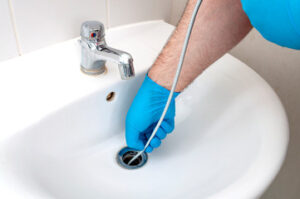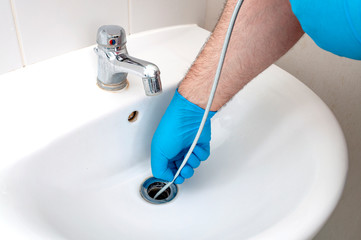Your drains keep the plumbing in your home functional, and if they are clogged, it can be frustrating or even damaging. Regularly scheduled Drain Cleaning Montgomery County keeps them in tip-top shape.
Avoid store-bought liquid drain cleaners; they contain chemicals that harm your pipes and health. Instead, let your plumber use better tools for your pipes and health.
Drains are vital to our everyday lives, but they can become clogged with waste from food, hair, soap scum, and more. These clogs often result in slow drainage, gurgling sounds or foul odors. Recognizing the early signs of a blocked drain can save you time and money by getting rid of the problem quickly.
If you notice a sudden loss of water flow from a sink, tub or toilet, it may be time to call for professional drain cleaning. A plumber from Frank Gay Services can use a wide variety of tools and techniques to remove even the most stubborn clogs.
Before you try any homemade DIY solutions, it’s important to note that the most common causes of clogs are food scraps, hair, grease, and other foreign objects. These items can cause significant damage to your pipes if not removed regularly.
One of the easiest ways to prevent these issues is by keeping a trash can close to your kitchen and bathroom sinks. You can also squirt a little bit of grease-fighting dish soap down the drain before pouring hot water into it.
Another great way to keep your drains clean is by using a mixture of baking soda and vinegar. This simple solution works by applying pressure to the clog and breaking it down. Mixing equal parts baking soda and vinegar and then covering it with a plug or putting something over the drain for 20-30 minutes can usually get the job done.
You can also try a snake, which is a small cable with sharp metal blades that cuts through and clears clogs. To use this tool, first remove the pop-up assembly from the drain and then plug in the snake. Position it over the clog and feed a few feet of the cable down the pipe while cranking the handle. After making some progress, turn off the motor and flush the drain with boiling water.
There are many other DIY clog-busting products on the market, such as air burst drain cleaners. However, these gimmicks are not effective and can cause more harm than good to your pipes. They can actually chew through the inside of your pipes, which can cause serious and costly damage.
Clogged Toilets
The most common cause of toilet clogs is non-flushable waste, such as toys, paper towels and cloth diapers. These items should never be flushed and can lead to more serious clogs as they make their way into the sewer system. These clogs can impact the entire house and will require professional sewer drain cleaning to correct.
Regular maintenance can help avoid toilet-related issues, but sometimes even the best efforts can lead to a clog. The most common solution is plunging, but there are some stubborn clogs that need more than just a plunger.
For hard clogs that are a result of grease or other thick materials, pouring hot (not boiling) water down the toilet drain can loosen and dislodge it. Pouring a mixture of dish soap and hot water down the toilet can also break up and dissolve the material. This method is messy, however, and may only be effective on small clogs.
Another option is to use a wet/dry vacuum. If you have one, place the end of the hose over the drain opening and turn on. Be sure the bathroom is well ventilated and be careful not to inhale any fumes. Be sure to sanitize the vacuum afterward.
A clogged toilet can cause significant problems, from toilet overflow to back-ups to sewage flooding the home. It is important to call a plumber right away if you can’t clear the clog yourself.
For the most serious clogs that occur in the sewer line, a plumber will need to use more advanced equipment to remove it. A plumber who specializes in sewer drain cleaning can utilize special tools that can break up and clear even the most stubborn clogs.
To prevent clogs, talk to your household about what is and isn’t flushable. Using less toilet paper and installing a bidet are other ways to reduce clogs. If your toilet is constantly clogging, consider scheduling regular drain cleaning and inspections to prevent buildup of debris and sludge. These services can save you money and prevent costly repairs.
Clogged Sinks
The kitchen sink is a frequent source of drain clogs, because it’s where food scraps, grease, hair and soap scum can build up. The resulting clogs can be particularly stubborn.
While Drano and other chemical drain cleaners might seem like the quick fix, they can often do more harm than good, including damaging your pipes and scratching up your sink enamel. And while plungers can break up loose clogs, they won’t deal with deep or persistent ones.
Instead, try some DIY remedies that don’t require any expensive equipment. Start by pouring a pot of boiling water down the drain, which can dissolve a variety of organic matter that might be blocking your drain. You can also try a mix of baking soda and vinegar. Pour one-half cup table salt down the drain, followed by a cup of vinegar. Let the mixture bubble, then flush with hot water. Repeat if necessary.
For serious clogs that these methods can’t break up, try using a drain snake. These tools can be found at most hardware stores and are essentially coiled metal wires with a broader gap at the end. Feed the tool down the drain, then crank it to move the clog along with it as it breaks up and pushes it through your pipe. Be sure to remove the P-trap and clean it out as well when you’re done.
If these simple solutions don’t work, it may be time to call in a professional. A trained plumber can use more advanced plumbing equipment, such as a hydro-jetter, to clear even the toughest drain clogs. This motorized device shoots a stream of high-pressure water down a drain pipe, scouring away all contaminants and breaking up any blockages that might be left behind.
To prevent clogs from developing in the first place, be sure to rinse off large food particles and wash your hands thoroughly after handling raw meat, fish or chicken. You can also absorb the excess oil from vegetables, fruits or meat in paper towels before washing them down the drain, and set up a compost bin for any vegetable peels and other food waste.
Clogged Showers
Clogged showers can be especially stubborn and difficult to deal with. Hair, soap scum, dead skin cells, and other debris can build up in your drainpipe over time, causing your shower to flow slowly or even stop altogether. Luckily, there are several quick and easy solutions that can help you unclog your shower.
Begin by removing any visible debris around the drain. You can use a pair of needle-nose pliers or tweezers to reach inside the drain and pull out any hair or gunk that is stuck. Be careful not to push any of the debris further down the drain, as this can make the clog worse.
Pouring boiling water down your drain can also help loosen grime and break down accumulated soap scum. It’s important to note that this solution should not be used if you have a steel or PVC pipe, as the heat from the boiling water can cause damage to these materials.
If the clog is caused by hair, try using a hair catcher that sits on top of your shower drain to catch all the debris before it can enter the pipe. This tool is available at most home supply stores, and is relatively inexpensive. Regularly cleaning your drain with a catcher and by using a wire coat hanger to fish out any strands of hair that are sticking out of the top of the drain can help prevent this problem in the future.
Another common cause of clogged showers is hard water. If your home has hard water, regularly using a clog-preventing drain cleaner can help reduce the build-up of minerals in your pipes. Installing a water softener is an additional option that can further reduce mineral deposits in your pipes, making them less likely to clog.
If your clogged shower doesn’t respond to any of these remedies, it may be a sign that you have a more serious blockage in your pipe that needs professional help. If you notice that the water in your shower is starting to bubble up or rise up through the floor, or if you hear gurgling noises coming from your drain, call a plumber right away.


